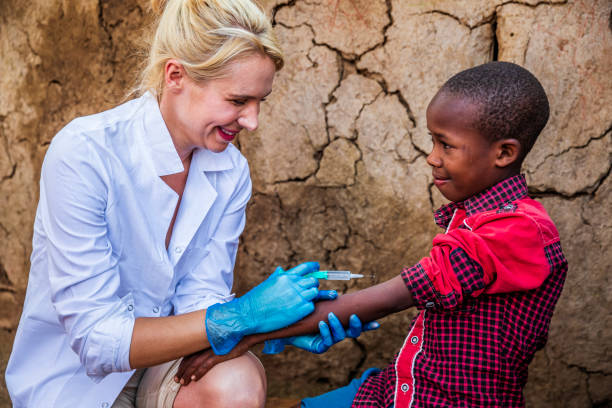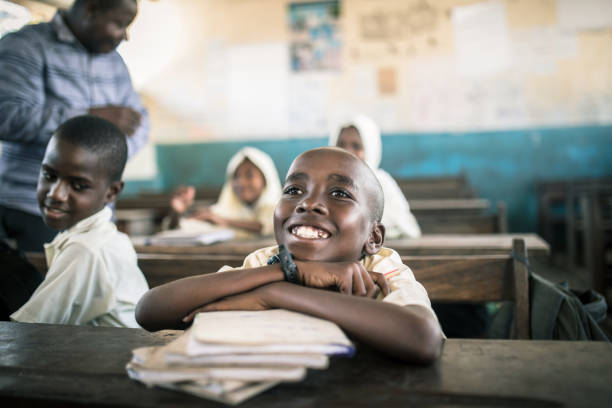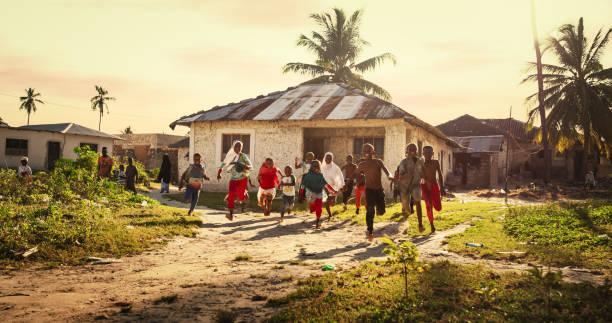In the heart of Africa, amidst the vibrant cultures and breathtaking landscapes, lies a continent grappling with formidable challenges. From economic hardships to humanitarian crises exacerbated by conflict, climate change, and food insecurity, Africa needs solidarity and support from the global community now more than ever.
Recent reports from African finance ministers highlight a triple shock facing the continent: rising debt burdens, an ongoing food crisis, and the fallout from climate change. These challenges, coupled with recurrent humanitarian needs stemming from conflict, displacement, and socioeconomic disparities, paint a stark picture of the realities faced by many African nations, such as Niger, which continues to struggle with significant humanitarian crises, including food insecurity, displacement, and epidemics.
To provide a comprehensive understanding of why certain African regions require assistance, it's essential to examine various factors such as economic indicators, social conditions, healthcare access, and educational opportunities. While statistics alone may not fully capture the complexities of these issues, they can offer valuable insights into the challenges faced by many African nations:
Poverty Rates:
According to the World Bank, Sub-Saharan Africa has the highest poverty rate globally. As of 2021, approximately 41% of the population in this region lived below the international poverty line, which is defined as earning less than $1.90 per day.
Healthcare Access:
Many African countries struggle with inadequate healthcare infrastructure and limited access to essential services. For instance, in some regions, the doctor-to-patient ratio is significantly low. In Sub-Saharan Africa, the average is approximately 1 doctor for every 5000 people, compared to 1 doctor for every 250 people in high-income countries.
Education:
Despite progress in recent years, access to quality education remains a challenge in many African countries. UNESCO reports indicate that approximately 33.8 million children of primary school age are out of school in Sub-Saharan Africa, and a significant portion of those who do attend lack access to quality education due to factors such as overcrowded classrooms and insufficient resources.
Malnutrition and Food Insecurity:
Africa continues to face significant challenges related to malnutrition and food insecurity. According to the Food and Agriculture Organization (FAO), as of 2021, nearly 239 million people in Sub-Saharan Africa were undernourished, representing approximately 22% of the population.
Infrastructure Development:
Inadequate infrastructure, including roads, electricity, and clean water supply, hinders economic development and limits access to essential services. The African Development Bank estimates that the continent requires significant investment in infrastructure, with an annual spending gap of about $68 to $108 billion.
Conflict and Instability:
Several African nations experience political instability and conflict, which not only disrupts daily life but also exacerbates existing challenges related to poverty, healthcare, education, and infrastructure. According to the Uppsala Conflict Data Program, as of 2021, Africa accounted for a significant portion of the world's armed conflicts.
Amidst these adversities, the role of volunteers emerges as a beacon of hope. Your decision to volunteer in Africa can have a profound impact, not only on the communities you serve but also on your own life.
Here's why Africa needs your volunteerism, and how your contribution can make a meaningful difference:

Addressing Humanitarian Needs:
Your gift of time and skills, combined with public grants and resources, can multiply in impact to address pressing humanitarian needs across the continent. Whether providing emergency food aid to families in the hardest-hit countries or offering support in conflict-affected regions, your volunteering efforts can help save lives and alleviate suffering.
Bringing Meaning and Purpose:
Volunteering offers more than just a chance to lend a helping hand; it provides a sense of meaning and purpose to your life. Engaging in meaningful work that directly impacts the lives of others can boost your self-esteem and overall well-being. It offers an opportunity to make a tangible difference in the world, fostering a sense of fulfilment that transcends material gains.
Alleviating Stress and Depression:
In addition to the benefits for the communities you serve, volunteering can also have a positive impact on your mental health. Studies have shown that volunteering can help reduce stress, alleviate symptoms of depression, and improve overall psychological well-being. By immersing yourself in service to others, you can find solace and fulfilment amid life's challenges.
Supporting Economically Vulnerable Countries:
Many African nations with weaker economies rely on tourism as a source of economic opportunity. However, the benefits of tourism often bypass local communities, particularly when visitors opt for all-inclusive resorts operated by international chains. By volunteering in Africa, you can support local economies directly, contributing to sustainable development and empowering communities to thrive.
If you're considering a volunteering opportunity in Africa, here are ten sought-after destinations across the continent where your support is needed:

Zambia :
Home to the spectacular Victoria Falls. In Livingstone, volunteers can engage in various initiatives aimed at making a positive impact on the local community and environment. Opportunities abound in education, where volunteers can assist in schools, provide tutoring, or support educational programs aimed at improving literacy rates and access to quality education. Healthcare projects offer volunteers the chance to work alongside local medical professionals, providing much-needed healthcare services to underserved communities. Additionally, environmental conservation projects allow volunteers to contribute to the preservation of Zambia's natural beauty, including efforts to protect wildlife habitats, promote sustainable practices, and mitigate the impacts of climate change.
Zimbabwe :
Experience the awe-inspiring beauty of Victoria Falls while contributing to community-based projects to improve livelihoods and promote sustainability. Also home to the awe-inspiring Victoria Falls, provides a picturesque backdrop for volunteer work focused on community development and sustainability. Volunteers in Zimbabwe can participate in a range of projects aimed at improving livelihoods and promoting sustainable practices within local communities. This may involve initiatives such as supporting small-scale agriculture, empowering women through skills training and entrepreneurship programs, or implementing conservation projects to safeguard natural resources and biodiversity.
Madagascar :
Madagascar boasts unparalleled biodiversity, making it a hotspot for conservation efforts. Volunteers in Madagascar have the opportunity to immerse themselves in the island's unique ecosystems while contributing to conservation initiatives aimed at protecting endangered species and fragile habitats. From monitoring wildlife populations to reforestation efforts and environmental education programs, volunteers play a crucial role in preserving Madagascar's natural heritage for future generations.
Ghana :
Volunteers can experience the vibrant culture and rich heritage of the country while supporting a wide range of initiatives aimed at community development and empowerment. From education and healthcare to women's empowerment and sustainable agriculture, there are numerous opportunities for volunteers to make a meaningful impact. Whether teaching in local schools, assisting with healthcare clinics, or promoting sustainable farming practices, volunteers in Ghana play a vital role in fostering positive change and building stronger, more resilient communities. Immerse yourself in Ghanaian culture and heritage while supporting initiatives ranging from education and healthcare to women's empowerment and sustainable agriculture.
Kenya :
As the bustling capital of Kenya, Nairobi offers a myriad of volunteering opportunities, including education, healthcare, and community development projects. Volunteers can contribute to education projects by teaching in schools, providing educational resources, or mentoring students. Healthcare initiatives allow volunteers to support clinics and hospitals, provide medical assistance, or raise awareness about public health issues. Additionally, community development projects focus on empowering local communities through skills training, infrastructure development, and social programs aimed at improving livelihoods and fostering inclusivity.
South Africa :
South Africa, with its rich cultural tapestry, offers volunteers the chance to engage in a wide range of initiatives aimed at youth development, environmental conservation, and social justice. In Cape Town, volunteers can work with youth organisations to provide mentorship, educational support, and recreational activities for young people. Environmental conservation projects focus on preserving South Africa's diverse ecosystems, including initiatives to protect endangered species, restore habitats, and promote sustainable tourism practices. Social justice initiatives address issues such as poverty, inequality, and human rights, empowering marginalised communities and advocating for positive change.
Tanzania :
Tanzania, known as the gateway to some of Africa's most iconic national parks, presents opportunities for volunteers to contribute to conservation and community development projects in the scenic city of Arusha. Conservation efforts may involve wildlife monitoring, habitat restoration, or environmental education programs aimed at raising awareness about conservation issues. Community development projects focus on improving access to education, healthcare, and economic opportunities for local communities, empowering them to thrive while promoting environmental sustainability. Known as the gateway to some of Africa's most iconic national parks, Arusha offers opportunities for conservation and community development projects.
South Africa - Kruger National Park:
Join conservation efforts in one of Africa's most iconic wildlife reserves, working to protect endangered species and preserve natural habitats. Volunteers have the unique opportunity to participate in conservation efforts within one of Africa's most iconic wildlife reserves. Projects may include wildlife monitoring and research, habitat restoration, anti-poaching initiatives, and community outreach programs aimed at promoting conservation awareness and sustainable practices. By joining conservation efforts in Kruger National Park, volunteers contribute to the protection of endangered species and the preservation of natural habitats, ensuring a brighter future for South Africa's rich biodiversity.

Volunteering in Africa is not just an opportunity to give back; it's a chance to forge meaningful connections, gain new perspectives, and impact the world. Your decision to volunteer in Africa can be a catalyst for positive change, both for the communities you serve and for yourself. Embrace the opportunity to make a difference and embark on a journey of service, compassion, and solidarity in the heart of Africa.
Volunteering in Africa presents a unique opportunity for individuals to make a tangible difference in the lives of others while embarking on a transformative journey of personal growth and fulfilment. As the continent navigates through its challenges, the collective efforts of volunteers from around the globe serve as beacons of hope, fostering resilience and driving positive change in communities across Africa.









